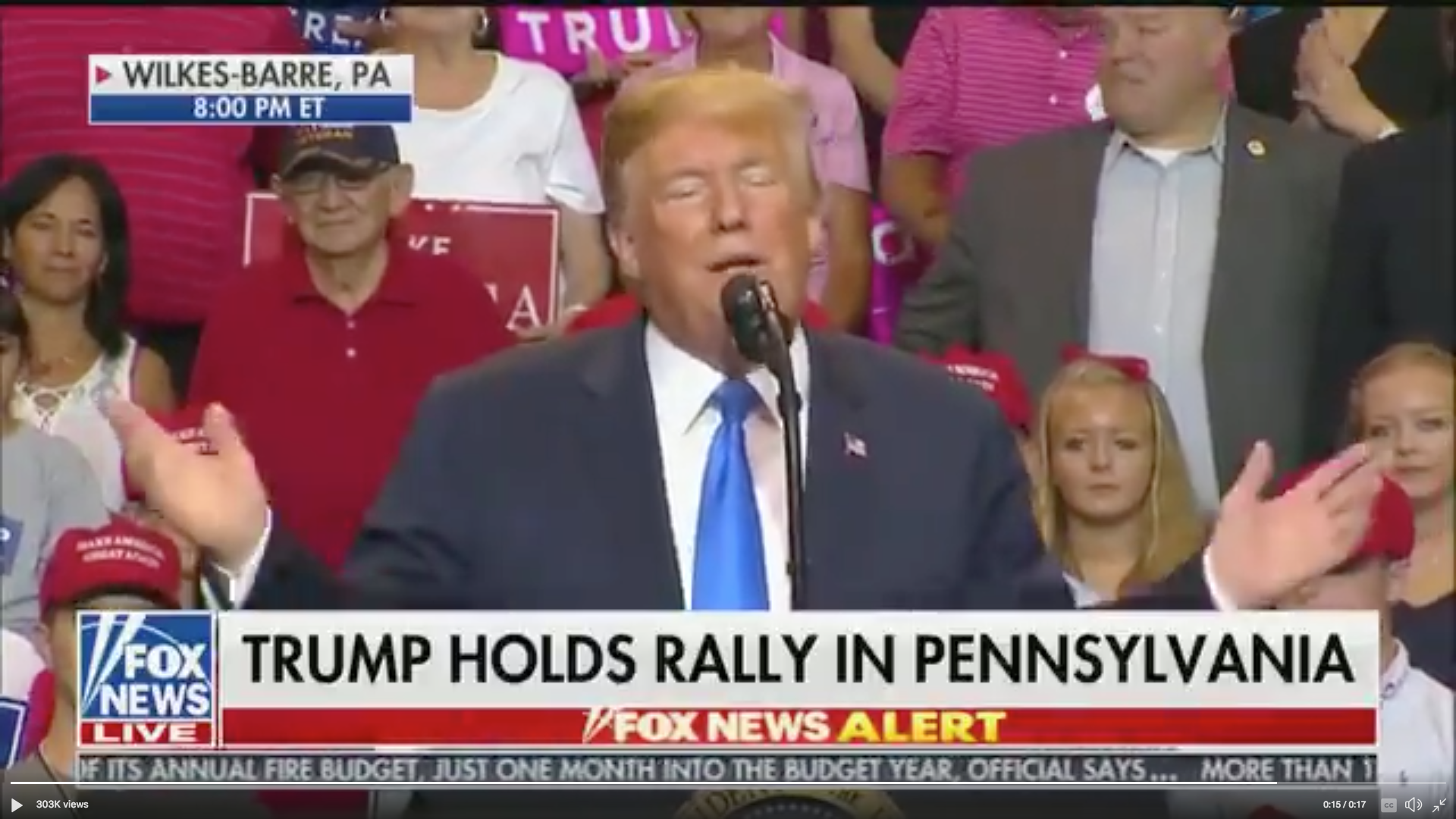Trump mimics John McCain, MS-13 stabbings, and a 'fake news' journalist during rowdy campaign rally


A free daily email with the biggest news stories of the day – and the best features from TheWeek.com
You are now subscribed
Your newsletter sign-up was successful
During a rally in Wilkes-Barre, Pennsylvania, on Thursday, President Trump took on many different roles.
First, he assumed the role of the press, which the White House has deemed the "enemy of the people." Trump was obsessed with his opinion that the media doesn't give him enough positive coverage, a complaint he returned to again and again throughout his 90-minute speech. While reliving the glorious night in 2016 when he won the election, Trump mocked a reporter who he said was panicking while covering the number of votes that Trump received. "His hands start shaking," said Trump, punctuating the impression with "fake news!"
Then the president moved on to a second character: a member of MS-13. While claiming that Sen. Bob Casey (D-Pa.) "doesn't mind MS-13 coming in" to the U.S., Trump acted out a stabbing, calling the gang "the slicers." Trump additionally said that immigrants who win visa lotteries are murderers, and blamed mass violence on migration.
The Week
Escape your echo chamber. Get the facts behind the news, plus analysis from multiple perspectives.

Sign up for The Week's Free Newsletters
From our morning news briefing to a weekly Good News Newsletter, get the best of The Week delivered directly to your inbox.
From our morning news briefing to a weekly Good News Newsletter, get the best of The Week delivered directly to your inbox.
In his final performance, Trump mimicked Sen. John McCain (R-Ariz.). The president said he would have finally vanquished Obamacare, "except one guy, at 2 o'clock in the morning, went in and said 'thumbs down,'" referring to when McCain was one of the few GOP lawmakers to oppose a repeal of the Affordable Care Act. Slack-jawed, Trump appeared to mock McCain's health, which has declined in recent months as the senator faces brain cancer. Summer Meza
A free daily email with the biggest news stories of the day – and the best features from TheWeek.com
Summer Meza has worked at The Week since 2018, serving as a staff writer, a news writer and currently the deputy editor. As a proud news generalist, she edits everything from political punditry and science news to personal finance advice and film reviews. Summer has previously written for Newsweek and the Seattle Post-Intelligencer, covering national politics, transportation and the cannabis industry.
-
 Why is the Trump administration talking about ‘Western civilization’?
Why is the Trump administration talking about ‘Western civilization’?Talking Points Rubio says Europe, US bonded by religion and ancestry
-
 Quentin Deranque: a student’s death energizes the French far right
Quentin Deranque: a student’s death energizes the French far rightIN THE SPOTLIGHT Reactions to the violent killing of an ultraconservative activist offer a glimpse at the culture wars roiling France ahead of next year’s elections
-
 Secured vs. unsecured loans: how do they differ and which is better?
Secured vs. unsecured loans: how do they differ and which is better?the explainer They are distinguished by the level of risk and the inclusion of collateral
-
 Labor secretary’s husband barred amid assault probe
Labor secretary’s husband barred amid assault probeSpeed Read Shawn DeRemer, the husband of Labor Secretary Lori Chavez-DeRemer, has been accused of sexual assault
-
 Trump touts pledges at 1st Board of Peace meeting
Trump touts pledges at 1st Board of Peace meetingSpeed Read At the inaugural meeting, the president announced nine countries have agreed to pledge a combined $7 billion for a Gaza relief package
-
 NIH director Bhattacharya tapped as acting CDC head
NIH director Bhattacharya tapped as acting CDC headSpeed Read Jay Bhattacharya, a critic of the CDC’s Covid-19 response, will now lead the Centers for Disease Control and Prevention
-
 Witkoff and Kushner tackle Ukraine, Iran in Geneva
Witkoff and Kushner tackle Ukraine, Iran in GenevaSpeed Read Steve Witkoff and Jared Kushner held negotiations aimed at securing a nuclear deal with Iran and an end to Russia’s war in Ukraine
-
 Pentagon spokesperson forced out as DHS’s resigns
Pentagon spokesperson forced out as DHS’s resignsSpeed Read Senior military adviser Col. David Butler was fired by Pete Hegseth and Homeland Security spokesperson Tricia McLaughlin is resigning
-
 Judge orders Washington slavery exhibit restored
Judge orders Washington slavery exhibit restoredSpeed Read The Trump administration took down displays about slavery at the President’s House Site in Philadelphia
-
 Hyatt chair joins growing list of Epstein files losers
Hyatt chair joins growing list of Epstein files losersSpeed Read Thomas Pritzker stepped down as executive chair of the Hyatt Hotels Corporation over his ties with Jeffrey Epstein and Ghislaine Maxwell
-
 Judge blocks Hegseth from punishing Kelly over video
Judge blocks Hegseth from punishing Kelly over videoSpeed Read Defense Secretary Pete Hegseth pushed for the senator to be demoted over a video in which he reminds military officials they should refuse illegal orders
